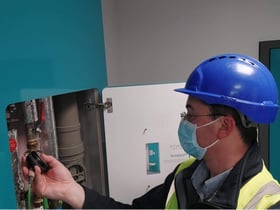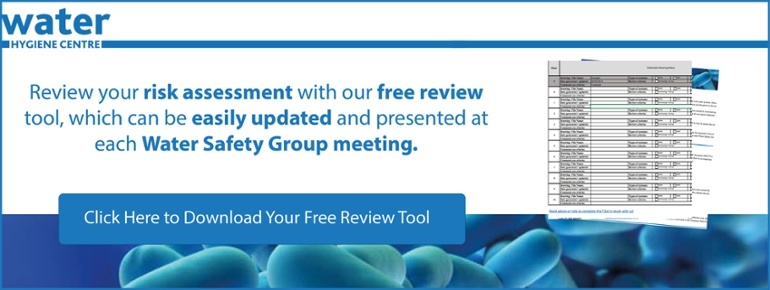UK legislation places a duty on building owners and those in charge of premises to manage the risks to health and safety associated with water systems.
Is it a legal requirement to have a Legionella risk assessment?
The Health & Safety Executive’s ACoP L8 paragraphs 25 and 47 state that Legionella risk assessments should be reviewed regularly and whenever there is a change of circumstances that could affect the risk.
This article discusses the frequently asked questions, “What is meant by regularly?” and, “How often should the risk assessment be reviewed?”
BS8580–1:2019 section 10.1 also gives guidance on the Legionella risk assessment review and the changes that may trigger the need to review the current assessment.
Healthcare organisations are required to establish a Water Safety Group (WSG) and formulate a Water Safety Plan (WSP); we’ve covered this, along with the role of the risk assessment in developing the plan, in an earlier blog “Legionella Risk Assessments and my Water Safety Plan?” and in our free downloadable “Guide to Water Safety For Healthcare Organisations”.
Legionella Risk Assessment - Identifying & Assessing Potential Risks
Risk assessments should identify potential hazards, such as pathogenic organisms e.g., Legionella pneumophila and Pseudomonas aeruginosa, scalding, chemical contamination and disruption to the water supply. They should consider all foreseeable events that may arise during the supply, storage, delivery, maintenance and use of the water.
A Legionella risk assessment alone is not sufficient and in healthcare sites should be accompanied by clinical risk assessments identifying the vulnerability of building occupants and the pathways by which water may come into contact with patients and invasive medical devices.
Our blog post “What a Legionnaires' Disease Risk Assessment Must Include” explains the requirements for a Legionella assessment. It should be carried out by a suitably competent person. The assessor should be able to demonstrate impartiality and independence from remedial or control tasks identified within the assessment.
Legionella Risk Assessment Frequency
 The two-year frequency for Legionella risk assessments was removed from the HSE’s ACoP L8 in 2013. One reason is the acknowledgment that some water systems are inherently very low risk and do not require elaborate controls. However, there is no reason to believe that things should be significantly different for water systems representing a medium to high risk, in which case the principal concern might have been an effort to escape the idea that a risk assessment is completed at two yearly intervals and placed on the shelf during the period in between.
The two-year frequency for Legionella risk assessments was removed from the HSE’s ACoP L8 in 2013. One reason is the acknowledgment that some water systems are inherently very low risk and do not require elaborate controls. However, there is no reason to believe that things should be significantly different for water systems representing a medium to high risk, in which case the principal concern might have been an effort to escape the idea that a risk assessment is completed at two yearly intervals and placed on the shelf during the period in between.
Risk assessment can mean different levels of intervention from a desktop review to a full invasive survey of the installation.
The assessment of risk is not an isolated exercise, it is an ongoing process and should evolve alongside the building’s usage. According to the HSE’s ACoP L8, the assessment should be reviewed whenever there is a reason to suspect it is no longer valid. This includes but is not limited to the following circumstances:
- Changes to the water system or its use;
- Changes to the use of the building in which the water system is installed;
- The availability of new information about risks or control measures;
- The results of checks indicating that control measures are no longer effective;
- Changes to key personnel;
- A case of legionnaires’ disease/legionellosis associated with the system.
Other Important factors to consider include:
- The management of water source and quality;
- The key risks identified and how these are changing over time;
- Whether key risks are being managed so far as is reasonably practicable;
- Resources and how they are prioritized;
- Escalation of risk management issues.
It is important to note, as stated in BS8580–1:2019, that a risk assessment review is the process of determining if the current risk assessment and scheme of control are still valid and effective.
If the review determines this as not the case, then a new Legionella risk assessment is required, which is, the process of identifying and assessing the risk of exposure to Legionella from work activities and from water systems or equipment.
 It may be helpful to the Water Safety Group to maintain a schedule of the various water systems under their control and when they were last assessed. This should be a standing agenda item for discussion at each Water Safety Group meeting to enable all involved to keep track of when the last assessment was carried out, and more importantly, when it was last reviewed or is due to be reviewed by the group. Cross-referencing against the review criteria above and the minimum review frequency set by the level of risk. This risk review matrix can be easily updated and reviewed at each Water Safety Group meeting and could be considered a standing agenda item. This could be as frequently as monthly, but we would suggest no less frequently than quarterly.
It may be helpful to the Water Safety Group to maintain a schedule of the various water systems under their control and when they were last assessed. This should be a standing agenda item for discussion at each Water Safety Group meeting to enable all involved to keep track of when the last assessment was carried out, and more importantly, when it was last reviewed or is due to be reviewed by the group. Cross-referencing against the review criteria above and the minimum review frequency set by the level of risk. This risk review matrix can be easily updated and reviewed at each Water Safety Group meeting and could be considered a standing agenda item. This could be as frequently as monthly, but we would suggest no less frequently than quarterly.
Conclusion
When dealing with water hygiene issues in premises, frequent reviews and updates to the risk assessment are key to keeping water systems safe.
The Legionella risk assessment frequency should be determined both by risk and by routinely cross-referencing prescribed review criteria on a more frequent basis.
The Water Hygiene Centre recommends that for rapidly changing environments the risk assessment matrix should be reviewed no less than every three months.
The Water Safety Group must be kept aware of aspects such as building evolution, patient demographics and maintenance schedules, so changes can be made to the risk assessment and any concerns addressed quickly and efficiently.
To enhance your learning further, read our article: What is a legionella risk assessment, mistakes to avoid and Frequency
Feel free to reach out if you have any questions about the issues mentioned above or if you would like to consult with one of our experts on water hygiene.
Editors Note: The information provided in this blog is correct at the date of original publication - August 2022 (Revised November 2025)
© Water Hygiene Centre 2025









